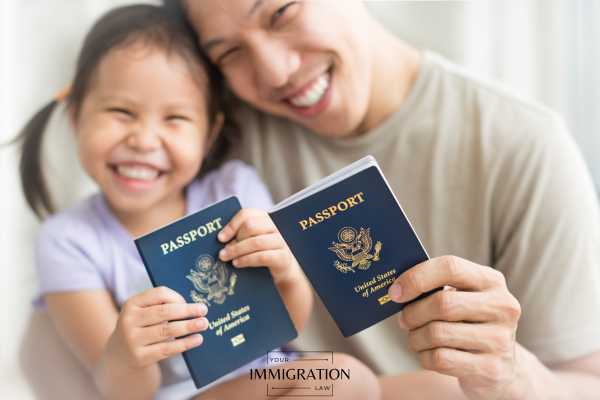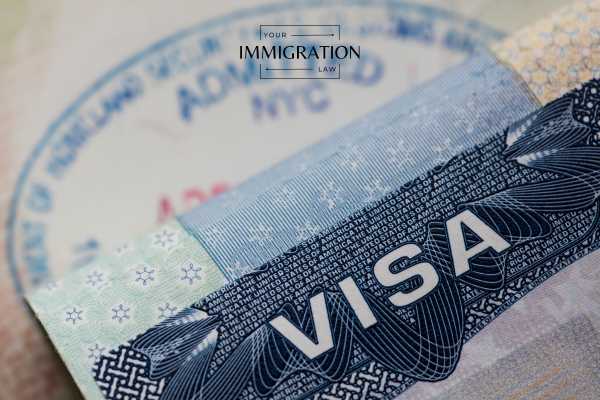For many families, living together in the United States is a dream filled with hope and love. Family visas are the key to making that dream a reality, allowing U.S. citizens and lawful permanent residents to bring their loved ones closer. However, navigating the world of family immigration can feel overwhelming.
That's where family immigration attorneys come in. They can help you understand the visa options available to you, including their eligibility requirements, the application process, and how to prepare for interviews. For help with a family visa, you can call 313-631-8080 to schedule a free consultation with our family immigration lawyers.
Let’s break down everything you need to know about family visa lawyers and the visa process.
Understanding the Types of Family Visas
Family-based visas come in two main categories: Immediate Relative (IR) visas and Family Preference (F) visas.
Immediate Relative Visas
Immediate relative visas are for close family members of American citizens, including spouses, minor children, and parents. The best part about IR visas is that there is no limit on the number issued each year, which means they can be processed more quickly. Immediate relative visas include:
- IR-1 Visa (Spouse of a U.S. Citizen): For the spouse of a U.S. citizen. This visa is available immediately and leads directly to a family green card.
- IR-2 Visa (Unmarried Child Under 21 of a U.S. Citizen): For children under 21 years old who are unmarried and have a U.S. citizen parent. This visa also provides a direct path to a green card.
- IR-3 Visa (Adopted Child of a U.S. Citizen): For children adopted abroad by U.S. citizens. The child must be under 16 years old at the time of adoption.
- IR-4 Visa (Orphan to be Adopted in the U.S.): For orphans who will be adopted by U.S. citizens after entering the U.S.

Family Preference Visas
Family preference visas are for more distant relatives, such as siblings and unmarried children of U.S. citizens and lawful permanent residents. Unlike IR visas, there are annual limits on the number of F visas granted, which can lead to lengthy waiting periods. They are categorized as follows:
- F1 Visa (Unmarried Sons and Daughters of U.S. Citizens): For unmarried children of U.S. citizens who are 21 years old or older.
- F2A Visa (Spouses and Children of Green Card Holders): For the spouses and unmarried children under 21 of lawful permanent residents (green card holders).
- F2B Visa (Unmarried Sons and Daughters of Green Card Holders): For unmarried children 21 years old or older of green card holders.
- F3 Visa (Married Sons and Daughters of U.S. Citizens): For married children of U.S. citizens.
- F4 Visa (Siblings of U.S. Citizens): For siblings of U.S. citizens who are 21 years old or older.
Path to a Family Green Card
For most of these family visas, once the visa petition is approved and the visa holder enters the U.S., they can adjust their status to become a permanent resident. The specific process includes:
- Visa Petition: A U.S. citizen or green card holder must file a petition with U.S. Citizenship and Immigration Services (USCIS) on behalf of their relative. This involves Form I-130, Petition for Alien Relative.
- Consular Processing or Adjustment of Status: If the relative is outside the U.S., they will apply for the family visa at a U.S. consulate or embassy. If they are already in the U.S., they may apply for adjustment of status using Form I-485, Application to Register Permanent Residence or Adjust Status.
- Green Card Issuance: Upon approval, the relative will receive a green card, granting them lawful permanent residency in the U.S.
Different types of visas have specific requirements based on the family relationships. For instance, a spouse must provide proof of marriage, while a sibling will need to show proof of their family connection.
Eligibility Requirements for Family Visas
To sponsor a family member for a visa, you must be either a U.S. citizen or a lawful permanent resident (green card holder). Sponsors must meet certain criteria, including:
- Being at least 18 years old.
- Demonstrating the ability to financially support the family member coming to the U.S.
Beneficiaries, or the family members wanting to come to the U.S., must prove their relationship to the sponsor. This can include documents like marriage certificates, birth certificates, or adoption records, depending on the visa type.
Different categories of family visas have specific requirements. For example, U.S. citizens can sponsor their parents, while green card holders cannot. Additionally, unmarried children and minor children have specific pathways to permanent residency.
The Family Visa Application Process
Applying for a family-based immigrant visa involves several important steps:
- Filing the Petition: The first step is for the sponsor to file Form I-130, also known as the Petition for Alien Relative. This form establishes the relationship between the sponsor and the beneficiary.
- Required Documentation: Along with the petition, you'll need to provide proof of the family relationship, such as marriage or birth certificates. You may also need to show your financial status.
- Processing Timeline: After submitting the petition, the U.S. Citizenship and Immigration Services (USCIS) will process it. The time it takes can vary. Immediate Relative visas are usually faster, while Family Preference immigrant visas might take longer due to annual caps.
How to Prepare for an Interview for a Family Visa Case
Once the immigrant visa petition is approved, the beneficiary will typically need to attend an interview at a U.S. embassy or consulate. Preparing for this interview is vital. Here are some tips:
- Practice Common Questions: Be ready to answer questions about your relationship with the sponsor. This could include how you met or details about your daily life together.
- Bring Necessary Documents: Ensure you have all the required application documents. This includes passports, medical exams, and proof of relationship.
- Stay Calm: Interviews can be stressful, but staying calm and answering questions honestly is important.
Challenges in Family Visa Cases
While many successfully navigate the family immigration visa process, challenges can arise:
- Delays and Denials: Sometimes applications get delayed or denied. Common reasons include missing documentation or failure to meet eligibility requirements.
- Accurate Documentation: Providing accurate and complete documentation is crucial. Any errors can lead to complications.

Family immigration attorneys play a critical role in overcoming these challenges. They can help identify potential issues early on, ensuring that all paperwork is in order and increasing the chances of approval.
If there are concerns about the sponsor's ability to support their family or issues proving relationships, immigration attorneys can help.
The Role of a Family Visa Lawyer
Family visa lawyers are essential guides through the complicated process. Their key responsibilities include:
- Assessing Eligibility: They help determine if you and your family member meet the requirements for the desired visa.
- Document Preparation: Lawyers ensure all forms are filled out correctly and all necessary documents are submitted.
- Navigating Complex Laws: Immigration laws can change frequently. A family-based immigration lawyer stays updated on these changes and helps you understand how they may affect your case.
Hiring an experienced immigration attorney can improve your chances of securing permanent residence for your loved ones. They can help you with family immigration laws. They will ensure your immigrant visa application is accurate. This will reduce the risk of delays or denials.
Frequently Asked Questions About Family Visas
How long does the family visa process take? The time varies depending on the visa category. F visas can take several years due to annual limits, whereas IR visas generally have shorter waiting times.
Can I bring my fiancé to the U.S.? Yes, you can apply for a fiancé visa (K-1 visa) to bring your fiancé to the U.S. for marriage. An experienced immigration attorney will be able to help you assemble all the documents you'll need for your visa petition.
What are visa priority dates? Visa priority dates determine your place in line for a Family Preference visa. If the demand exceeds the supply, your wait time may be longer.
Secure Your Family's Future Speak to a Trusted Visa Lawyer
Bringing family members to the United States can be a rewarding journey filled with hope and excitement. However, it often requires careful planning and a clear understanding of the family immigration process.
Family immigration attorneys are invaluable resources, offering their knowledge to help navigate the complex process. Whether you are sponsoring a spouse, minor children, or unmarried children, having a knowledgeable lawyer by your side can make the entire process smoother and increase your chances of success.
If you’re ready to take the next step in reuniting with your loved ones, contact an experienced family immigration lawyer today. Our legal team can provide the guidance and support you need to ensure your family is together where they belong.